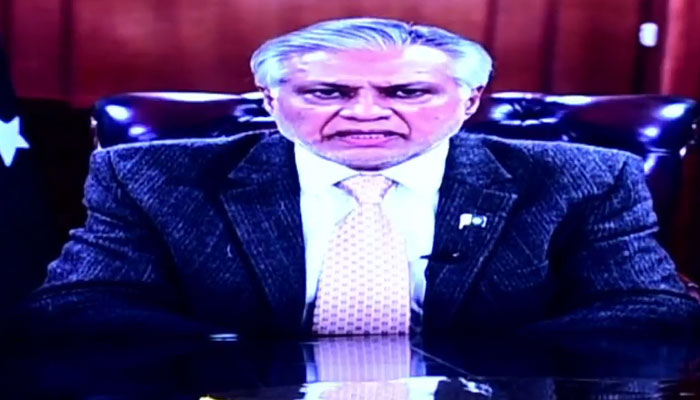Dar asks South Asian countries to boost regional trade
Deputy PM says real impediment to growth in South Asia was fact that it was one of least integrated regions in terms of trade
KARACHI: Deputy Prime Minister and Foreign Minister Muhammad Ishaq Dar has termed trade restrictions a major issue of South Asia stating that South Asian countries conduct only 5 per cent of their trade within the region.
He was speaking on Friday at the South Asian Federation of Accountants (SAFA) conference organised by the Institute of Chartered Accountants of Pakistan (ICAP) under the title, ‘South Asia’s Economic Outlook: Challenges and Opportunities’.
He said the real impediment to growth in South Asia was the fact that it was one of the least integrated regions in terms of trade.
He remarked that despite being home to nearly 25 per cent of the world’s population, regional trade in South Asia remained less than 5 per cent of the total trade volume.
Dar said Pakistan had embarked on a journey of reforms and transformation to stabilise its economy and foster sustainable growth.
“We are focused on creating an ecosystem that supports investment, promotes exports, and harnesses the potential of our human capital. Our Strategic Trade Policy Framework, energy diversification initiatives and digital transformation agenda are just a few examples of our commitment to building a resilient economy,” he said, adding that the government recognised the need for addressing trade barriers, both related to and not related to tariff, to unlock its export potential.
Dar was of the view that Pakistan’s economy like many others in the region had been facing formidable challenges including global economic uncertainties and impact of climate change. “Yet it is also a moment of opportunity he remarked,” he said.
The deputy prime minister asserted that in today’s world, governance and policy reforms were no longer optional but imperative.” For Pakistan, this means addressing structural bottlenecks, strengthening institutions and ensuring transparency and accountability at every level,” he remarked.
-
 Timothee Chalamet Admits To Being Inspired By Matthew McConaughey's Performance In 'Interstellar'
Timothee Chalamet Admits To Being Inspired By Matthew McConaughey's Performance In 'Interstellar' -
 'Determined' Savannah Guthrie Plans To Honour Her Mother Nancy With Major Move: 'It's Going To Be Emotional'
'Determined' Savannah Guthrie Plans To Honour Her Mother Nancy With Major Move: 'It's Going To Be Emotional' -
 Train's Pat Monahan Blows The Lid On 'emotional' Tale Attached To Hit Song 'Drops Of Jupiter'
Train's Pat Monahan Blows The Lid On 'emotional' Tale Attached To Hit Song 'Drops Of Jupiter' -
 Kurt Russell Spills The Beans On His Plans For Milestone Birthday This Year: 'Looking Forward To It'
Kurt Russell Spills The Beans On His Plans For Milestone Birthday This Year: 'Looking Forward To It' -
 PayPal Data Breach Exposed Sensitive User Data For Six-month Period; What You Need To Know
PayPal Data Breach Exposed Sensitive User Data For Six-month Period; What You Need To Know -
 Prince William Receives First Heartbreaking News After Andrew Arrest
Prince William Receives First Heartbreaking News After Andrew Arrest -
 11-year-old Allegedly Kills Father Over Confiscated Nintendo Switch
11-year-old Allegedly Kills Father Over Confiscated Nintendo Switch -
 Jacob Elordi Talks About Filming Steamy Scenes With Margot Robbie In 'Wuthering Heights'
Jacob Elordi Talks About Filming Steamy Scenes With Margot Robbie In 'Wuthering Heights' -
 Why Prince Harry Really Wants To Reconcile With King Charles, Prince William, Kate Middleton?
Why Prince Harry Really Wants To Reconcile With King Charles, Prince William, Kate Middleton? -
 'Grief Is Cruel': Kelly Osbourne Offers Glimpse Into Hidden Pain Over Rockstar Father Ozzy Death
'Grief Is Cruel': Kelly Osbourne Offers Glimpse Into Hidden Pain Over Rockstar Father Ozzy Death -
 Timothée Chalamet Reveals Rare Impact Of Not Attending Acting School On Career
Timothée Chalamet Reveals Rare Impact Of Not Attending Acting School On Career -
 Liza Minnelli Gets Candid About Her Struggles With Substance Abuse Post Death Of Mum Judy Garland
Liza Minnelli Gets Candid About Her Struggles With Substance Abuse Post Death Of Mum Judy Garland -
 'Saturday Night Live' Star Will Forte Reveals How He Feels About Returning To The Show After 2010 Exit
'Saturday Night Live' Star Will Forte Reveals How He Feels About Returning To The Show After 2010 Exit -
 Police Officer Arrested Over Alleged Assault Hours After Oath-taking
Police Officer Arrested Over Alleged Assault Hours After Oath-taking -
 Maxwell Seeks To Block Further Release Of Epstein Files, Calls Law ‘unconstitutional’
Maxwell Seeks To Block Further Release Of Epstein Files, Calls Law ‘unconstitutional’ -
 Prince William Issues 'ultimatum' To Queen Camilla As Monarchy Is In 'delicate Phase'
Prince William Issues 'ultimatum' To Queen Camilla As Monarchy Is In 'delicate Phase'




